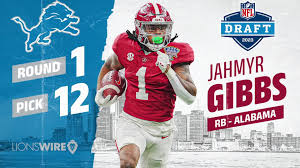There’s a reason why Jahmyr Gibbs was picked number 12 in the 2023 NFL Draft, and it goes beyond just his athleticism and raw talent. When the Detroit Lions made the bold decision to select the dynamic running back out of Alabama, many fans and analysts alike were left scratching their heads. After all, selecting a running back that high in the modern NFL isn’t common practice. Yet, when you look deeper into Gibbs’ game and the vision that the Lions have for their future, the selection begins to make a lot more sense.
To understand why Gibbs was chosen at number 12, it’s crucial to evaluate not just his skill set but also the changing philosophy of the Lions’ front office. Detroit has been on a mission to establish a more dynamic and explosive offense, and Gibbs fits that mold perfectly. He’s not your traditional power back who will wear down a defense over four quarters. Instead, Gibbs is the kind of player who can score from anywhere on the field, thanks to his speed, vision, and versatility. This ability to generate big plays is precisely what Detroit needs to break out of the cycle of mediocrity and make a genuine playoff push.
Coming out of Alabama, Gibbs had already established himself as one of the most electrifying players in college football. His combination of speed and elusiveness made him a nightmare for opposing defenses, while his versatility as both a runner and receiver made him invaluable in the Crimson Tide’s offense. In a league that’s increasingly favoring dual-threat players, Gibbs offers the complete package. His ability to line up in the slot, catch passes out of the backfield, and break tackles in the open field is precisely why he shot up draft boards leading into April.
Another reason for the pick can be traced back to the Lions’ offensive philosophy under head coach Dan Campbell and offensive coordinator Ben Johnson. The Lions are crafting a unit built on speed and versatility, making Gibbs a natural fit. Detroit already boasted a strong offensive line and a bruising running game, but what they lacked was a true game-breaker who could change the complexion of a game with a single touch. Gibbs’ ability to take a short pass or a handoff to the house is precisely what the Lions needed to diversify their offensive attack.
Additionally, Gibbs’ pass-catching ability can’t be overstated. In today’s NFL, running backs who can’t catch are becoming less and less valuable, and Gibbs brings a skill set reminiscent of players like Alvin Kamara and Christian McCaffrey. His hands are reliable, his routes are crisp, and his burst after the catch is lethal. The Lions knew that to keep pace with high-powered offenses across the league, they needed a player who could create mismatches against linebackers and safeties alike. Gibbs is that weapon.
Some skeptics argue that picking a running back that high is inherently risky, especially given the positional value discussion that dominates modern draft discourse. However, the Lions made a calculated decision, betting that Gibbs’ potential to impact the game as both a runner and a receiver would outweigh those concerns. In a way, this selection mirrors the way the San Francisco 49ers utilize Christian McCaffrey or how the New Orleans Saints have leaned on Alvin Kamara. It’s not just about pounding the rock between the tackles; it’s about creating mismatches and forcing defenses to adjust to a player who can line up anywhere on the field.
Moreover, Gibbs’ character and work ethic played a significant role in his draft position. Coaches and scouts alike raved about his maturity and dedication to the game. In Detroit, where the culture shift is centered around toughness, resilience, and accountability, Gibbs fits right in. His willingness to put in the work and elevate his game makes him an ideal player to build around as the Lions look to climb the ranks in the NFC North.
There’s also a strategic element at play here. The Lions saw the opportunity to grab a player who, while technically a running back, could significantly boost their passing game. Think about the way the Kansas City Chiefs use their running backs as extensions of the passing attack. Gibbs’ ability to stretch the field horizontally and turn short passes into long gains is a major asset in an offense that needs to keep defenses honest.
Ultimately, the decision to pick Gibbs at number 12 reflects a fundamental shift in how the Lions view their roster and their path forward. Rather than adhering to outdated conventions about positional value, they prioritized explosiveness and versatility. Gibbs provides both in abundance, and while it may take time for skeptics to come around, the Lions clearly believe that he’s a cornerstone piece for the future.
The key takeaway is that Detroit didn’t just draft a running back—they drafted an offensive weapon. Gibbs’ impact will extend beyond the ground game, and his ability to contribute as a pass-catcher and game-breaker is why the Lions felt confident investing a high pick in him. Only time will tell if the gamble pays off, but the vision is clear: The Lions are building an offense that can strike quickly and relentlessly, and Gibbs is set to be at the heart of that transformation.



